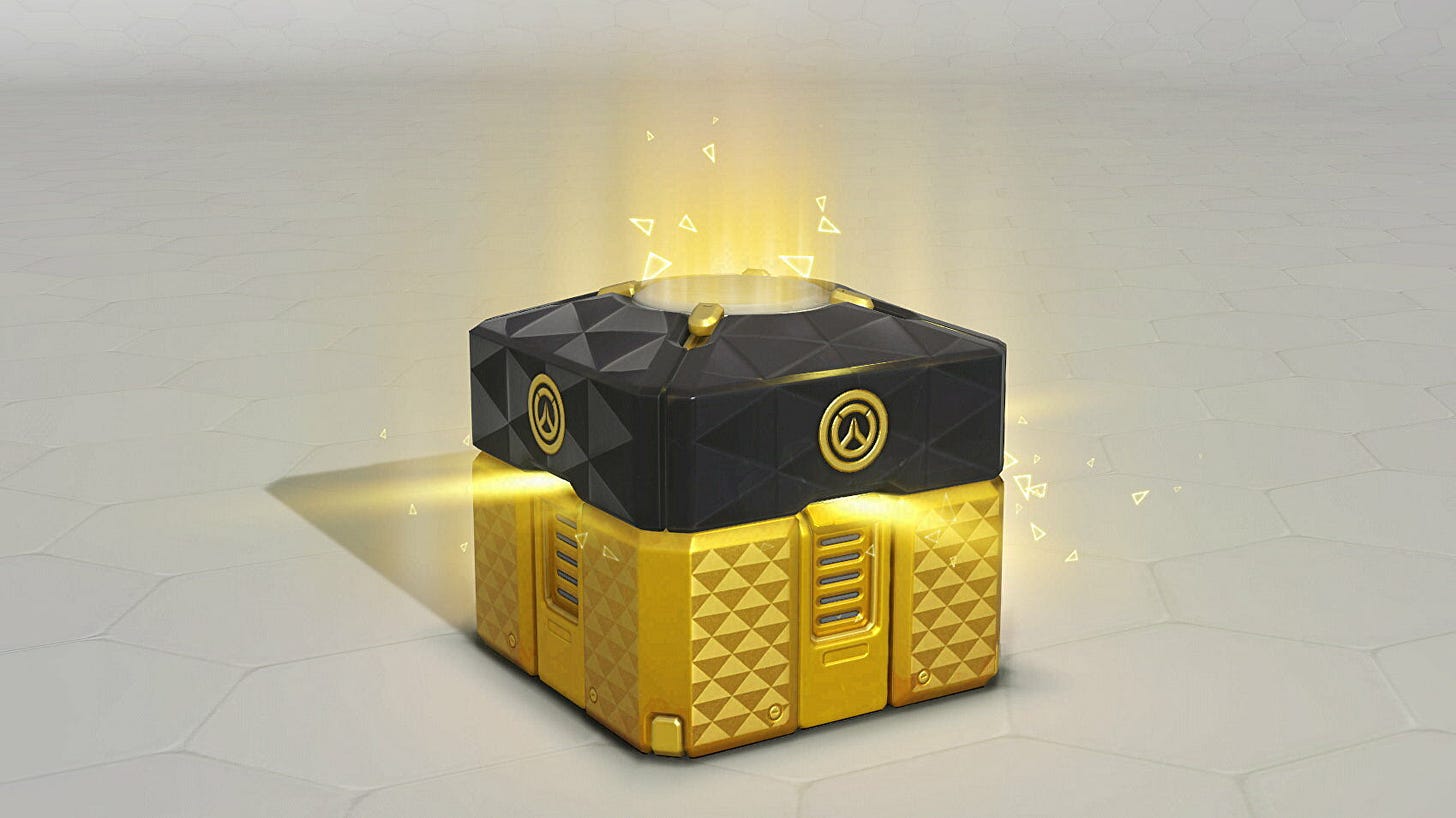Nevada esports betting committee to develop regulation, event whitelist
Sharpr is a weekly newsletter covering the intersection of esports and betting
Hey everyone, Cody here.
It’s been a busy week in the gaming space led by FaZe Clan’s $725M USD SPAC deal and public listing on the NASDAQ.
On the betting front, Nevada’s esports task force is getting very sharp on regulation to support the segment, including developing an event whitelist.
Overseas, the U.K. government has decided that political intervention is not necessary to curb problem gambling behavior associated with the use of loot boxes in games, and instead called on the industry to self-regulate. We’ll see how well that goes.
Despite your stance on the matter, it’s hard not to laugh at this viral moment where a fan pulls a rare loot box cosmetic in the crowd of one of the biggest Counter-Strike events of the year.
In this week’s edition of Sharpr…
Nevada esports betting committee to develop regulation, event whitelist
U.K. government calls on industry to self-regulate loot boxes
FaZe Clan debuts NASDAQ listing in $725 Million SPAC deal
If this newsletter was forwarded to you, please consider subscribing.
Nevada esports betting committee to develop regulation, event whitelist
Nevada’s esports betting segment is poised to take some important steps in the coming months to accelerate its expansion.
During the Esports Technical Advisory Committee’s second-ever meeting on Monday, the group revealed it will begin developing recommendations next month to be voted on during its October meeting. These recommendations would be delivered to the Nevada Gaming Control Board and Nevada Gaming Commission for consideration.
Seth Schorr, committee member and CEO of Fifth Street Gaming, is optimistic about reaching a regulatory middleground in the upcoming months, and that Nevada’s esports offering will soon be “off to the races.”
“After our second meeting, I think we now have the information we need from the industry to make recommendations to the Gaming Control Board by Q4 of this year,” Schorr told CDC Gaming. “A whitelist is created and I see us having everything we need to be taking esports wagers soon after.”
Currently, Nevada state licensed operators require regulatory approval to accept wagers on each esports event, a cumbersome process desperately in need of streamlining, according to committee member and UNLV Research Director Dr. Brett Abarbanel. To Schorr’s point, a pre-approved list of esports events would overcome a number of these obstacles, and it’s something the committee will work on over the course of its next two meetings.
“We know the [Gaming Control Board] is very enthusiastic and doesn’t want to waste any time,” Schorr added. “Theoretically, we can see a calendar of events for 2023 that is an in-depth whitelist of matches and leagues that operators can place wagers on.”
The unanswered question left for committee members to sort out prior to its next meeting is whether or not esports will fall under Regulation 22, the state regulation which defines horse racing and sports betting. New regulations will be required should esports not meet this criteria.
Eric Bowers, vice president of innovation at Boyd Gaming, anticipates esports would fit under existing state regulations, though from a marketing, branding, and launch perspective, esports would be “its own animal.”
“Esports would get lost in that,” Bowers said. “If you don’t separate [esports] and segment that out from a marketing and app perspective, [esports] is not going to get the visibility that it needs to be successful.”
The committee also held from a variety of data rights holders, including GRID, Bayes Esports, and Oddin. Each of the guest speakers advocated for the importance of official data in esports, where latency presents the most challenging issues.
🦈 Sharpr Take: The Esports Technical Advisory Committee has clearly kicked into high gear this week. The chamber opted not to wait until its next quarterly meeting to tackle these hot items, but instead regroup next month and accelerate efforts to establish esports betting in Nevada.
These next two meetings may very well set the foundation for what could be a breakthrough for state regulation of esports wagering, including the provision of a pre-approved list of events. Currently, the only esports event pre-approved by Nevada regulators is the Golden Tee World Championship (I wish I was kidding).
Appropriate regulatory frameworks and a whitelist would help overcome the state’s biggest obstacles and create more opportunities for consumers to access and engage in esports betting.
In 2020, at the height of pandemic closures, Nevada regulators approved a record 12 esports events–but there’s been none since. Removing the unwieldy (and expensive) regulatory approval process would make esports far more attractive for operators, though (to several points made during this week’s hearing) marketing and technology will distinguish offerings in a market yet to mature into esports.
U.K. government calls on industry to self-regulate loot boxes
The U.K. government has decided against enacting regulations to combat the use of loot boxes, despite incriminating findings. Following a two-year case study into the matter launched by the Department for Digital, Culture, Media and Sport (DCMS), the government has called on video game industry stakeholders to improve consumer protections.
DCMS Secretary of State Nadine Dorries says that government intervention would risk “unintended consequences” and pursuing legislative action without industry-led measures to protect children would be “premature.”
The department has proposed that game companies provide parental spending controls, transparent information on loot box probabilities, and improved research (such as access to player data) for future policies.
The DCMS inferred that loot box regulation would be too cumbersome for the U.K. Gambling Commission to manage, but that any future restrictions would likely be woven into the Gambling Act.
Research from InGAME commissioned by the U.K. government showed a "stable and consistent association between loot box use and problem gambling,” while greater loot box spending was related to problem gambling harms. The research firm noted that empirical evidence is still emerging, and the findings could not explicitly confirm whether or not a casual relationship between loot box spending and problem gambling behaviors exist.
An “important distinction” in the department’s decision was that loot box rewards can’t be “cashed out” for real money like its traditional gambling counterparts (slot machines or sports betting), and that these items are intended to enhance the in-game experience. Broadly speaking, these remarks are only half true.
For example, in Counter-Strike: Global Offensive, weapon skins rewarded through loot boxes can fetch thousands of dollars. These skins can be sold on the Steam Marketplace, but not withdrawn outside of the platform; however, the U.K. Gambling Commission has previously acknowledged that third-party websites will allow people to exchange items for real money.
The DCMS will form a technical working group comprising members from the game industry, government departments, academics, and regulation organizations to establish industry-wide protections without the need for political intervention. The technical working group will provide an update on its progress in the first quarter of 2023.
Dr. David Zendle, a video games expert at University of York, is critical of this approach, saying that the industry won’t stand in the way of this important revenue driver (in-game transactions made up 88% of digital game spending in 2020).
“Prior select committee inquiries have unambiguously shown that certain bad actors within the video game industry cannot be trusted to self-regulate when it comes to player protection.
“By making those same industry bodies the ones that are responsible for regulating loot boxes, DCMS is essentially guaranteeing that foxes are the ones guarding the hen house.”
🗞 In the news
GG.BET is named exclusive betting partner of the PGL Major Arlington 2022.
Sports Information Services has launched its 24/7 Counter-Strike: Global Offensive betting product.
Trust Dice partners with Oddin for esports odds feeds and risk management services.
📈 By the numbers
FaZe Clan debuts on NASDAQ in $725 Million SPAC deal.
XSET completed a $15M Series A funding round led by LightWork Worldwide.
The Apex Legends Global Series Championship drew 632,000 concurrent viewers.






